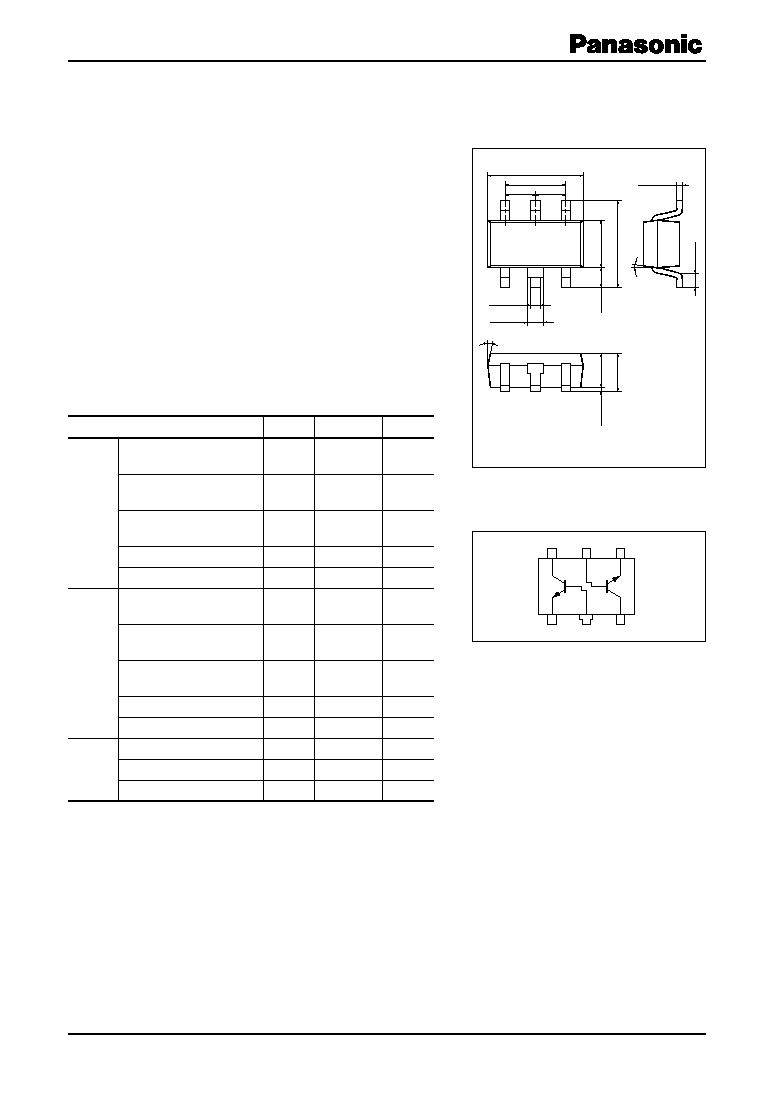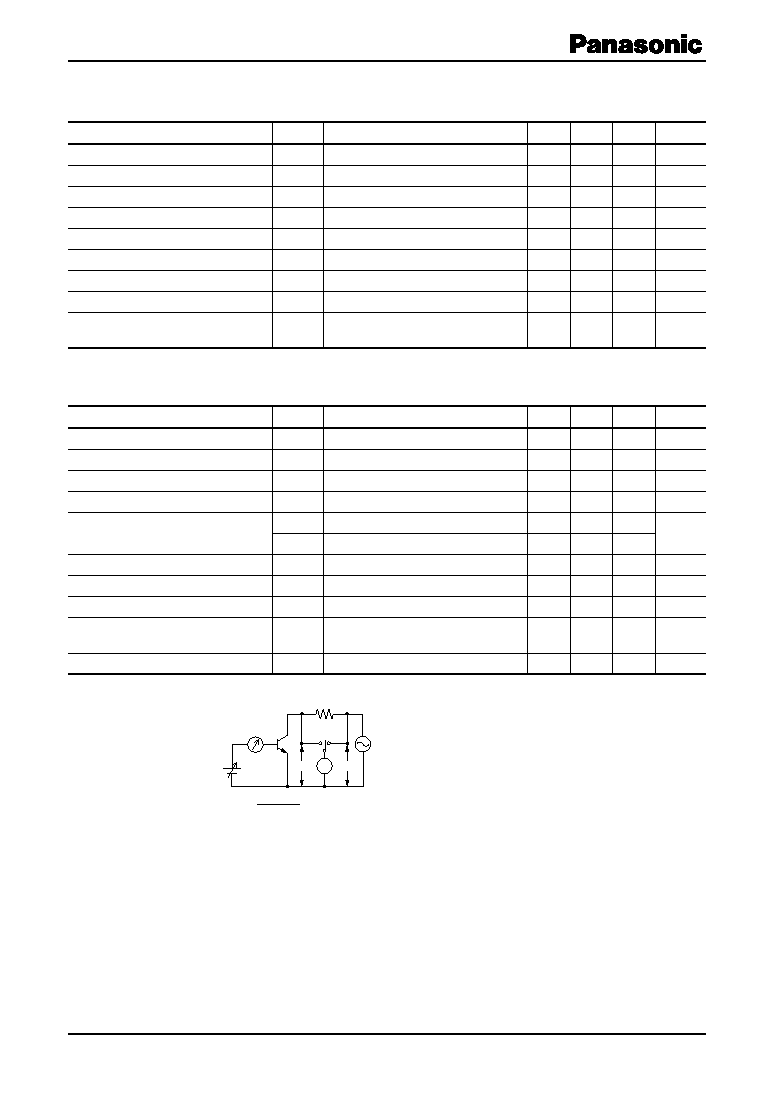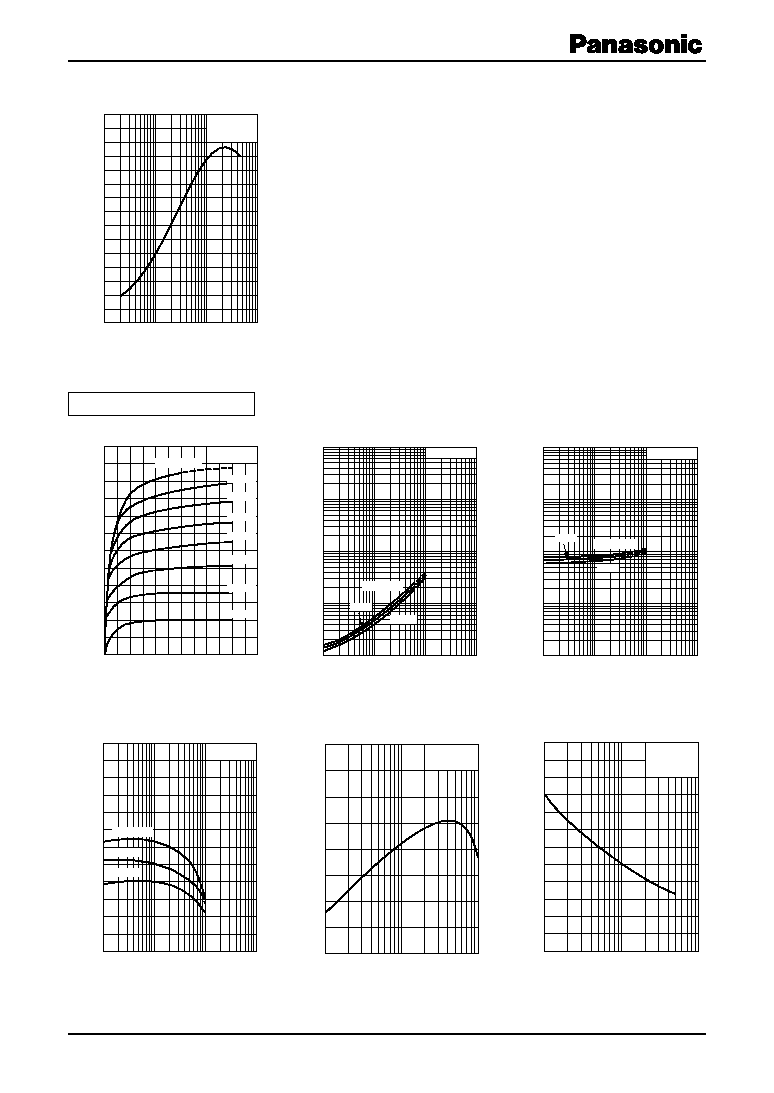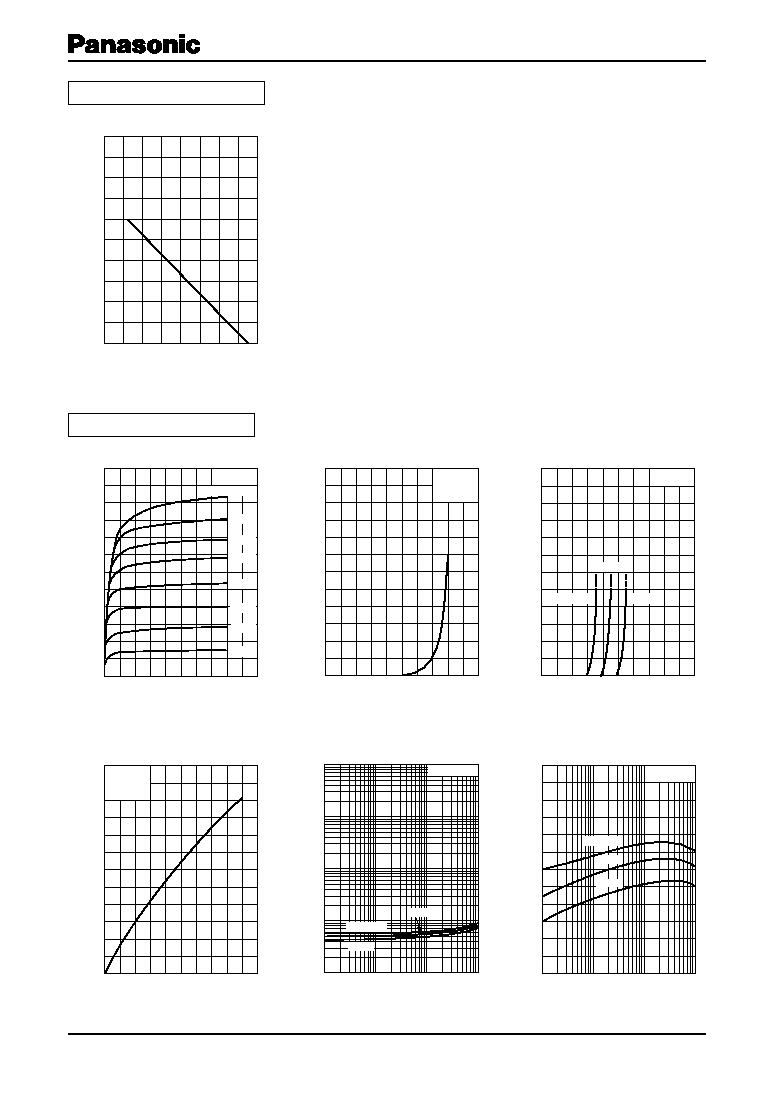
Composite Transistors
1
Publication date: February 2004
SJJ00079BED
XN04505
(XN4505)
Silicon NPN epitaxial planar type
For general amplification (Tr1)
For amplification of low-frequency output (Tr2)
Features
· Two elements incorporated into one package
· Reduction of the mounting area and assembly cost by one half
Basic Part Number
· 2SD0601A (2SD601A) + 2SD1328
Absolute Maximum Ratings T
a
= 25°C
Marking Symbol: DZ
Internal Connection
Unit: mm
Note) The part number in the parenthesis shows conventional part number.
2.90
1.9
±0.1
0.16
+0.10
0.06
2.8
+0.2 0.3
1.1
+0.3 0.1
1.1
0 to 0.1
+0.2 0.1
1.50
(0.65)
0.4
±
0.2
+0.25 0.05
(0.95)
0.30
+0.10
0.05
0.50
+0.10
0.05
(0.95)
6
5
4
1
3
2
+0.20
0.05
5°
10°
Tr2
Tr1
5
4
3
2
1
6
Parameter
Symbol
Rating
Unit
Tr1
Collector-base voltage
V
CBO
60
V
(Emitter open)
Collector-emitter voltage
V
CEO
50
V
(Base open)
Emitter-base voltage
V
EBO
7
V
(Collector open)
Collector current
I
C
100
mA
Peak collector current
I
CP
200
mA
Tr2
Collector-base voltage
V
CBO
25
V
(Emitter open)
Collector-emitter voltage
V
CEO
20
V
(Base open)
Emitter-base voltage
V
EBO
12
V
(Collector open)
Collector current
I
C
0.5
A
Peak collector current
I
CP
1
A
Overall
Total power dissipation
P
T
300
mW
Junction temperature
T
j
150
°C
Storage temperature
T
stg
-55 to +150
°C
1: Collector (Tr1)
4: Collector (Tr2)
2: Base (Tr2)
5: Base (Tr1)
3: Emitter (Tr2)
6: Emitter (Tr1)
EIAJ: SC-74
Mini6-G1 Package

XN04505
2
SJJ00079BED
· Tr2
Electrical Characteristics T
a
= 25°C ± 3°C
· Tr1
Note) 1. Measuring methods are based on JAPANESE INDUSTRIAL STANDARD JIS C 7030 measuring methods for transistors.
2. *1: Pulse measurement
*2: R
on
test circuit
Parameter
Symbol
Conditions
Min
Typ
Max
Unit
Collector-base voltage (Emitter open)
V
CBO
I
C
= 10 µA, I
E
= 0
25
V
Collector-emitter voltage (Base open)
V
CEO
I
C
= 1 mA, I
B
= 0
20
V
Emitter-base voltage (Collector open)
V
EBO
I
E
= 10 µA, I
C
= 0
12
V
Collector-base cutoff current (Emitter open)
I
CBO
V
CB
= 25 V, I
E
= 0
0.1
µA
Forward current transfer ratio
*1
h
FE1
V
CE
= 2 V, I
C
= 0.5 A
200
800
h
FE2
V
CE
= 2 V, I
C
= 1 A
60
Collector-emitter saturation voltage
*1
V
CE(sat)
I
C
= 0.5 A, I
B
= 20 mA
0.13
0.40
V
Base-emitter saturation voltage
*1
V
BE(sat)
I
C
= 0.5 A, I
B
= 20 mA
1.2
V
Transition frequency
f
T
V
CB
= 10 V, I
E
= -50 mA, f = 200 MHz
200
MHz
Collector output capacitance
C
ob
V
CB
= 10 V, I
E
= 0, f = 1 MHz
10
pF
(Common base, input open circuited)
ON resistance
*2
R
on
1.0
V
V
1 k
R
on
=
V
B
× 1 000
()
V
A
- V
B
f
= 1 kHz
V
= 0.3 V
V
B
I
B
= 1 mA
V
A
Note) Measuring methods are based on JAPANESE INDUSTRIAL STANDARD JIS C 7030 measuring methods for transistors.
Parameter
Symbol
Conditions
Min
Typ
Max
Unit
Collector-base voltage (Emitter open)
V
CBO
I
C
= 10 µA, I
E
= 0
60
V
Collector-emitter voltage (Base open)
V
CEO
I
C
= 2 mA, I
B
= 0
50
V
Emitter-base voltage (Collector open)
V
EBO
I
E
= 10 µA, I
C
= 0
7
V
Collector-base cutoff current (Emitter open)
I
CBO
V
CB
= 20 V, I
E
= 0
0.1
µA
Collector-emitter cutoff current (Base open)
I
CEO
V
CE
= 10 V, I
B
= 0
100
µA
Forward current transfer ratio
h
FE
V
CE
= 10 V, I
C
= 2 mA
160
460
Collector-emitter saturation voltage
V
CE(sat)
I
C
= 100 mA, I
B
= 10 mA
0.3
0.5
V
Transition frequency
f
T
V
CB
= 10 V, I
E
= -2 mA, f = 200 MHz
150
MHz
Collector output capacitance
C
ob
V
CB
= 10 V, I
E
= 0, f = 1 MHz
3.5
pF
(Common base, input open circuited)

XN04505
4
SJJ00079BED
Characteristics charts of Tr2
I
C
V
CE
V
CE(sat)
I
C
V
BE(sat)
I
C
h
FE
I
C
f
T
I
E
C
ob
V
CB
f
T
I
E
0
300
240
180
120
60
Transition frequency f
T
(MHz
)
Emitter current I
E
(mA)
-10
-1
-1
-10
-10
2
V
CB
= 10 V
T
a
= 25°C
0
0
6
1
5
2
4
3
1.2
1.0
0.8
0.6
0.4
0.2
Collector current I
C
(A
)
Collector-emitter voltage V
CE
(V)
T
a
= 25°C
I
B
= 4.0 mA
2.5 mA
2.0 mA
1.5 mA
0.5 mA
1.0 mA
3.0 mA
3.5 mA
Collector-emitter saturation voltage V
CE(sat)
(V
)
Collector current I
C
(A)
10
-2
10
-2
10
-1
1
10
10
2
10
-1
1
10
I
C
/ I
B
= 25
T
a
= 75°C
25
°C
-25°C
Base-emitter saturation voltage V
BE(sat)
(V
)
Collector current I
C
(A)
10
-2
10
-2
10
-1
1
10
10
2
10
-1
1
10
I
C
/ I
B
= 10
T
a
= -25°C
25
°C
75
°C
0
1 200
1 000
800
600
400
200
Forward current transfer ratio h
FE
Collector current I
C
(A)
10
-2
10
-1
1
10
V
CE
= 2 V
T
a
= 75°C
25
°C
-25°C
-1
-10
-10
2
0
400
300
200
100
Transition frequency f
T
(MHz
)
Emitter current I
E
(mA)
V
CB
= 10 V
T
a
= 25°C
1
0
24
20
16
12
8
4
10
10
2
f
= 1 MHz
I
E
= 0
T
a
= 25°C
Collector-base voltage V
CB
(V)
Collector output capacitance
(Common base, input open circuited)
C
ob
(pF)

Request for your special attention and precautions in using the technical information
and semiconductors described in this material
(1) An export permit needs to be obtained from the competent authorities of the Japanese Government if any of
the products or technical information described in this material and controlled under the "Foreign Exchange
and Foreign Trade Law" is to be exported or taken out of Japan.
(2) The technical information described in this material is limited to showing representative characteristics and
applied circuits examples of the products. It neither warrants non-infringement of intellectual property right
or any other rights owned by our company or a third party, nor grants any license.
(3) We are not liable for the infringement of rights owned by a third party arising out of the use of the technical
information as described in this material.
(4) The products described in this material are intended to be used for standard applications or general elec-
tronic equipment (such as office equipment, communications equipment, measuring instruments and house-
hold appliances).
Consult our sales staff in advance for information on the following applications:
· Special applications (such as for airplanes, aerospace, automobiles, traffic control equipment, combus-
tion equipment, life support systems and safety devices) in which exceptional quality and reliability are
required, or if the failure or malfunction of the products may directly jeopardize life or harm the human
body.
· Any applications other than the standard applications intended.
(5) The products and product specifications described in this material are subject to change without notice for
modification and/or improvement. At the final stage of your design, purchasing, or use of the products,
therefore, ask for the most up-to-date Product Standards in advance to make sure that the latest specifica-
tions satisfy your requirements.
(6) When designing your equipment, comply with the guaranteed values, in particular those of maximum rat-
ing, the range of operating power supply voltage, and heat radiation characteristics. Otherwise, we will not
be liable for any defect which may arise later in your equipment.
Even when the products are used within the guaranteed values, take into the consideration of incidence of
break down and failure mode, possible to occur to semiconductor products. Measures on the systems such
as redundant design, arresting the spread of fire or preventing glitch are recommended in order to prevent
physical injury, fire, social damages, for example, by using the products.
(7) When using products for which damp-proof packing is required, observe the conditions (including shelf life
and amount of time let standing of unsealed items) agreed upon when specification sheets are individually
exchanged.
(8) This material may be not reprinted or reproduced whether wholly or partially, without the prior written
permission of Matsushita Electric Industrial Co., Ltd.
2003 SEP




